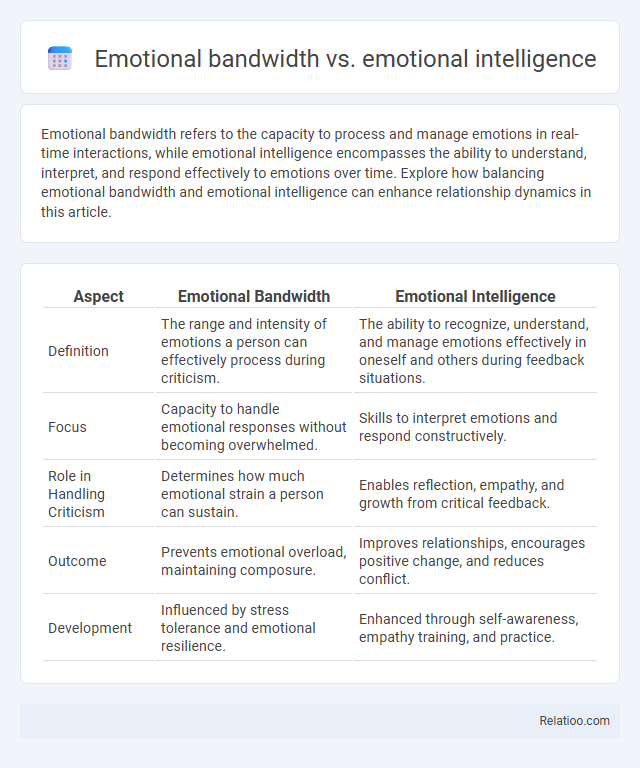Emotional bandwidth refers to the capacity to process and manage emotions in real-time interactions, while emotional intelligence encompasses the ability to understand, interpret, and respond effectively to emotions over time. Explore how balancing emotional bandwidth and emotional intelligence can enhance relationship dynamics in this article.
Table of Comparison
| Aspect | Emotional Bandwidth | Emotional Intelligence |
|---|---|---|
| Definition | The range and intensity of emotions a person can effectively process during criticism. | The ability to recognize, understand, and manage emotions effectively in oneself and others during feedback situations. |
| Focus | Capacity to handle emotional responses without becoming overwhelmed. | Skills to interpret emotions and respond constructively. |
| Role in Handling Criticism | Determines how much emotional strain a person can sustain. | Enables reflection, empathy, and growth from critical feedback. |
| Outcome | Prevents emotional overload, maintaining composure. | Improves relationships, encourages positive change, and reduces conflict. |
| Development | Influenced by stress tolerance and emotional resilience. | Enhanced through self-awareness, empathy training, and practice. |
Understanding Emotional Bandwidth
Emotional bandwidth refers to the capacity your mind has to process and manage emotions effectively, influencing decision-making and stress response. Unlike emotional intelligence, which encompasses skills like empathy and emotional regulation, emotional bandwidth focuses on the available emotional resources at any given moment. Understanding emotional bandwidth helps you recognize when emotional overload may impair your ability to respond thoughtfully in complex situations.
Defining Emotional Intelligence
Emotional intelligence refers to the ability to recognize, understand, and manage one's own emotions while effectively navigating interpersonal relationships with empathy and self-regulation. Emotional bandwidth describes the limited cognitive and emotional capacity individuals have to process and respond to emotional information at any given time. Understanding emotional intelligence involves developing skills to optimize emotional bandwidth, enabling better decision-making, stress management, and social interactions.
Key Differences Between Emotional Bandwidth and Intelligence
Emotional bandwidth refers to the capacity to process and manage emotional information under stress or complex social situations, while emotional intelligence is the ability to recognize, understand, and influence emotions in yourself and others. Your emotional bandwidth limits how much emotional information you can effectively handle at once, influencing decision-making and interpersonal interactions. Key differences lie in emotional intelligence being a broader skill set for emotional management, whereas emotional bandwidth quantifies the mental resources available for emotional processing in real-time scenarios.
How Emotional Bandwidth Influences Daily Interactions
Emotional bandwidth refers to the capacity of your mind to process and manage emotional information, impacting how effectively you navigate daily social interactions. Higher emotional bandwidth allows you to remain composed and responsive under stress, improving communication and empathy in relationships. Unlike emotional intelligence, which encompasses skills like recognizing and managing emotions, emotional bandwidth highlights the actual mental resources available for emotional processing in real-time situations.
The Role of Emotional Intelligence in Relationships
Emotional intelligence plays a pivotal role in relationships by enabling individuals to recognize, understand, and manage their own emotions while empathizing with others' feelings, thereby enhancing communication and conflict resolution. Emotional bandwidth refers to the capacity to process and respond to emotional signals, which directly influences the effectiveness of emotional intelligence in interpersonal interactions. High emotional intelligence combined with sufficient emotional bandwidth supports deeper connection, trust-building, and resilience in relationships.
Factors That Affect Emotional Bandwidth
Emotional bandwidth refers to the capacity to process and manage emotional information, which can be limited by stress, fatigue, and cognitive overload. Emotional intelligence involves recognizing, understanding, and regulating emotions effectively, influencing how well you handle emotional bandwidth demands. Factors that affect emotional bandwidth include mental health, sleep quality, environmental stressors, and social support, all playing crucial roles in your emotional resilience and decision-making abilities.
Developing Emotional Intelligence Skills
Developing emotional intelligence skills enhances your ability to understand and manage emotions effectively, which differs from emotional bandwidth--the capacity to process emotional information without becoming overwhelmed. Emotional intelligence involves recognizing, interpreting, and responding to emotions in yourself and others, while emotional bandwidth refers to the mental energy available for handling emotional experiences. Strengthening your emotional intelligence increases your emotional bandwidth by improving resilience and emotional regulation.
Managing Emotional Overload vs. Building Emotional Insight
Managing emotional overload requires effective use of emotional bandwidth, which limits the amount of emotional information you can process at once, preventing overwhelm and burnout. Emotional intelligence enhances your ability to build emotional insight by accurately perceiving, understanding, and regulating emotions in yourself and others. Balancing emotional bandwidth and emotional intelligence enables you to prevent overload while deepening emotional awareness and resilience for better interpersonal relationships and decision-making.
Practical Strategies for Enhancing Both
Emotional bandwidth refers to the capacity to process and manage emotional information, while emotional intelligence encompasses skills like recognizing, understanding, and regulating emotions. Practical strategies to enhance both include mindfulness practices to increase emotional awareness, active listening to improve empathetic understanding, and cognitive-behavioral techniques to regulate emotional responses effectively. Regular self-reflection and seeking feedback from trusted peers can further expand emotional bandwidth and sharpen emotional intelligence in personal and professional contexts.
The Impact on Mental Health and Well-Being
Emotional bandwidth refers to your capacity to process and manage emotional information at any given time, while emotional intelligence encompasses the skills to recognize, understand, and regulate emotions effectively. High emotional intelligence enhances your emotional bandwidth, enabling better stress management and resilience, which directly supports mental health and well-being. Limited emotional bandwidth can lead to emotional overload, increasing vulnerability to anxiety and burnout, highlighting the importance of developing emotional intelligence for sustained emotional health.

Infographic: Emotional bandwidth vs emotional intelligence
 relatioo.com
relatioo.com